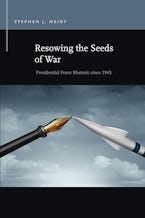Ending a war, as Fred Charles Iklé wrote, poses a much greater challenge than beginning one. In addition to issues related to battle tactics, prisoners of war, diplomatic relations, and cease-fire negotiations, ending war involves domestic political calculations. Balancing the tides of public opinion versus policy needs poses a deep and enduring problem for presidents. In a first-of-its-kind study, Resowing the Seeds of War explains how Presidents Truman, Eisenhower, Nixon, and Obama managed the political, policy, and bureaucratic challenges that arise at the end of war via a series of rhetorical choices that reframe, modify, or unravel depictions of national enemies, the cause of the conflict, and the stakes for the nation and world. This end-of-war rhetoric justifies ending hostilities, rationalizes postwar national policy, argues for the construction of postwar security arrangements, and often sustains public support for massive financial investment in reconstruction. By tracking presidential manipulations of savage imagery from World War II to the War on Terror, this book concludes that even as metaphoric reframing facilitates exit from conflict, it incurs unexpected consequences that make national involvement in the next conflict more likely.
ContentsAcknowledgmentsPrefaceChapter 1. The Recivilized Savage: Harry Truman and the Victory of the Good WarChapter 2. The Mobile Savage: Harry Truman, Dwight Eisenhower, and Stalemate in KoreaChapter 3. Erasing the Savage: Richard Nixon, the Architecture of Peace, and the Eternal VietnamChapter 4. The Disembodied Savage: Barack Obama and the Perpetuity of National ViolenceChapter 5. The Eternal Savage: War, the Globalization of Violence, and the Sovereign Power of the PresentNotesIndex
Stephen J. Heidt has taught at Florida Atlantic University, California Lutheran University, and California State University, Northridge, focusing on the form and function of presidential rhetoric in policy deliberation. He has published in Rhetoric & Public Affairs, the Southern Communication Journal, and a number of edited volumes.

